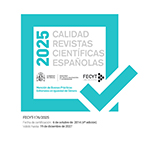Diseño de un modelo de evaluación y desarrollo docente en una universidad privada
Resumen
La universidad que quiera responder al principio de excelencia académica, debe conocer de manera exhaustiva el desarrollo e impacto de la actividad docente, investigadora y de gestión de los profesores que en ella desempeñan su labor profesional. Para ello es necesario establecer un procedimiento riguroso que proporcione información válida y suficiente acerca de los procesos de enseñanza que contribuyen a lograr los objetivos estratégicos de la universidad, los medios que propician la mejora continua del proceso de aprendizaje, el modo en que se implican los responsables de ejercer el liderazgo en la organización, el compromiso de los profesores con la Dirección Académica, los métodos de identificación de necesidades de formación y desarrollo y las maneras en que se incentiva la calidad esperada y percibida y la excelencia docente. De esta manera podrán tomarse decisiones convenientes y oportunas para mejorar los aspectos críticos detectados y potenciar aquellos cuya valoración ha sido positiva.
Para validar una propuesta de este tipo, en la UFV se ha implementado un sistema de desarrollo y evaluación del desempeño docente que tiene la pretensión de superar algunas de las limitaciones del Programa DOCENTIA, adecuando el desarrollo de las competencias profesionales de los profesores a las expectativas organizacionales expresadas en las líneas estratégicas de la universidad. Para ello, define las competencias, acciones y comportamientos profesionales y personales relevantes para el cumplimiento de la Misión universitaria, integrando las misiones y objetivos en un sistema de mejora profesional y personal acompañado por el director académico, recompensando la excelencia en términos estratégicos y organizativos y permitiendo que los sistemas de delegación, de autonomía y de dirección de los profesores se ajusten, se redefinan y se adapten al sistema de gobierno de la universidad.
Descargas
Descarga artículo
Licencia
La Revista Complutense de Educación, para fomentar el intercambio global del conocimiento, facilita el acceso sin restricciones a sus contenidos desde el momento de su publicación en la presente edición electrónica, y por eso es una revista de acceso abierto. Los originales publicados en esta revista son propiedad de la Universidad Complutense de Madrid y es obligatorio citar su procedencia en cualquier reproducción total o parcial. Todos los contenidos se distribuyen bajo una licencia de uso y distribución Creative Commons Reconocimiento 4.0 (CC BY 4.0). Esta circunstancia ha de hacerse constar expresamente de esta forma cuando sea necesario. Puede consultar la versión informativa y el texto legal de la licencia.











